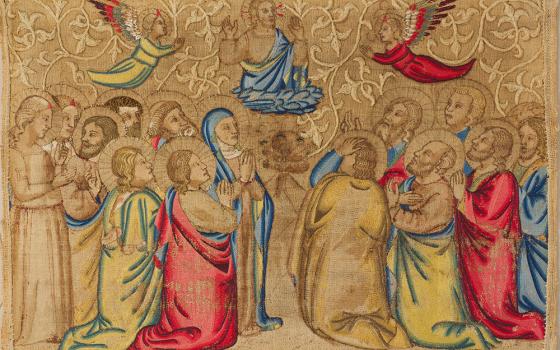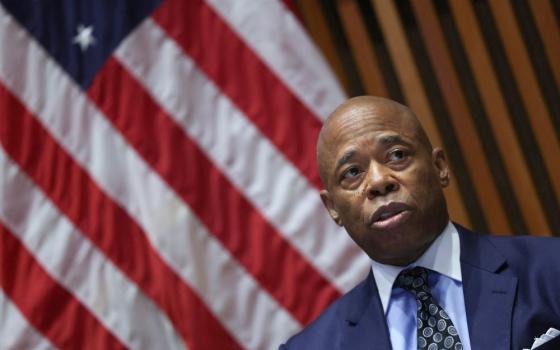Every society, every person, unofficially abridges the New Testament to suit its preferences and values. Certain passages, perhaps whole chapters, are effectively ignored as contrary to their interests. Among the bitter pills that Americans have identified and judged irrelevant are the warnings about wealth. They are among what are called the "hard sayings" for good reason. Here is a particular hair-raising example, Jesus speaking in the Gospel of Luke about what it takes to be a disciple: "So therefore, none of you can become my disciple if you do not give up all your possessions."
The Gospels are loaded with Jesus' declarations that big money can destroy the soul, yet we as a free enterprise, "greed is good" culture tosses these alerts into the dust bin because we presume to know better. And we adjust income numbers to fit within "ordinary middle class" definitions so as to avoid being classified as rich. Rich is relative, to be sure, but goes far beyond the one percent which equates to a two-income family making about $390,000 a year, less than many people think for that category. One hundred thousand dollars is a lot of money, too, yet whole professions like tenured professors, journalists and, of course, lawyers, are abundantly populated with those in that bracket, and up, many of whom will stoutly deny that they are among the wealthy.
The current obligatory, mini-discussion about poverty scarcely touches this subject, yet most all those who wax mightily on "solutions" for the desperate plight of poor people belong to that class. Call it wealthy or highly privileged; either way its a stratosphere above the people whom they are slicing and dicing.
As Bill Bishop demonstrated magnificently in his book, The Big Sort, the upper classes (let's call them the hundred grand and above) have distanced themselves so far from the people that they are speaking about that they know less about the daily anatomy of poverty than any generation in our history. Bishop shows that we are more economically segregated now than ever. Upper ruling class people, overwhelmingly white, rarely if ever come into contact with poor or working class people other than perhaps their indentured help.
The upscale college students I once taught, for instance, came from posh suburbs, went to rich colleges with mostly rich students, and exited into a corporate or professional career and housing that were by and large highly exclusionary. They are moving farther from lower classes and more fortified against them. So-called elite colleges which love to display "diversity" fall flat on their faces when it comes to class. Yes, perhaps there are a few more Latinos, Asians and African Americans but most are from the same upper economic realms as their white counterparts. In a recent article, Inside Higher Education noted that among the 50 riches universities, the two with the lowest numbers of students from lower economic families (as measured by those receiving Pell Grants) were Yale and Notre Dame. Just 12% in each student body. Public universities are far in the lead; even Columbia had 30%.
There were no grand old days when the common good prevailed, but the past did have a few more class connections. In my New England factory town, for instance nearly all owners and managers lived in the community, attended its churches and shopped in its stores where they were bound to run into the very people who worked on the assembly lines. I prefer to think that the relative cheek-by-jowl arrangement encouraged at least some accountability. Now the bosses zip to distant suburbs and gilded preserves. Likewise, Downton Abby isn't exactly a model of class justice but the blue bloods do have more than a flo-chart's acquaintance with their servants. The interaction is often remarkable on a human level.
I worry because the wealthy are the ones who tend to vote. They vote on crucial public policy that directly affects poor people. They generally know nothing about poor people other than snatches of reports on poverty issued by people like themselves. It is the highly affluent journalistic crowd that reports the results, usually sympathetically, but with no more grasp of the realities than those who produced the report.
It's doubtful that America is serious about putting a big dent in poverty. The unspeakable assumption among many in the ruling class is that a large pool of poor people are necessary to keep wages down by keeping competition for jobs high. The upper classes also depend on the labor of the working poor to earn a disproportionate share of the income. So no powerful movement to end such as system is likely to emerge from the top. Conferences and reports salve whatever guilt there may be over the growing gap; meanwhile not only doesn't anything get done but what help there is assailed as "fat." It serves the upper classes to blame poor people for their own suffering, of course, because it reinforces their myths about self-reliance and superior character.
If the New Testament diagnosis of wealth is correct, contrary to the well polished rationalizations, then the well-heeled are close to the edge of the abyss. Viewed in that light, they are the problem that needs fixing. But as the saying goes, don't expect those who are paid to maintain a certain position to renounce it. It would surely be more of the same. Perhaps the only way to do it would be to wheedle a wagon train of money for a team of poor people to examine the lifestyles and values of the rich to find what most inflicts poverty. Don't look for such a diagnosis soon but I think it would be interesting. Maybe it could save the souls of many in the top strata.
Meanwhile, I entertain the slim hope that the privileged will quit telling poor people what to do.







